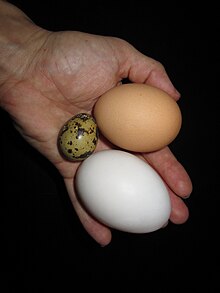Duck egg
Duck eggs , the eggs of duck birds , are on average larger and heavier than chicken eggs , they weigh around 60 to 75 grams (corresponding to the weight classes L to XL for chicken eggs). Duck eggs have a proportionally larger and more strongly colored yolk , the shell is somewhat thicker, the taste more intense.
They used to be considered a delicacy in Europe and were also commonly used for cooking and baking, like chicken eggs. Due to the way ducks live , there is an increased risk of infestation with salmonella and other pathogens. In Great Britain , an outbreak of paratyphoid fever is said to have been caused by the consumption of duck eggs in the 1920s . In Germany in 1936 the first legal regulations for the trade in them were enacted, which are modified and still apply today and stipulate that the eggs should only be placed on the market with the imprint "Consumer advice: Heat up for 10 minutes before consumption". After this time they are cooked through and all pathogens are killed.
In the course of the "First Regulation on the Amendment of Provisions for the Implementation of Community Food Hygiene Law" ( 1. EULMRDVÄndV ), the Egg and Egg Products Regulation was repealed. Since then, only the regulations of the Tier-LMHV for direct marketers and retailers and VO 853 for large producers apply. Both regulations contain specific hygiene requirements for food of animal origin, without specifically addressing duck eggs. Today, duck eggs are rarely offered in Germany. Duck eggs from commercial rearing systems are i. d. Usually free from salmonella. When buying, it is important to ensure that the laying animals are monitored accordingly.
Duck eggs have 0.41 g more carbohydrates and 2.97 g more protein per serving than a chicken egg. They impress with their versatility and depth of taste. Duck eggs achieve fuller and richer flavors. Duck eggs are just as easy to use today as an ordinary chicken egg. Pastry chefs choose duck eggs for their yolk and creamy taste. It is ideal for meringues, crème brûlées or cakes.
In Asia they still play a bigger role today. In China they are used to make millennial eggs , among other things , in the Philippines and Vietnam balut , boiled duck eggs that have been incubated for around two weeks.
The physiological calorific value of fresh duck eggs is approx. 750 - 840 kJ / 100 g (180 - 200 kcal / 100 g), with a content of 15 g fat, 13 g protein , 0.54 mg vitamin A , 1.2 mg β- Carotene , 5 µg vitamin D and 5.4 µg vitamin B 12 .
